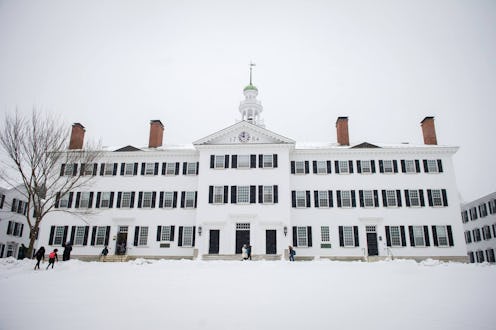News
Dartmouth Bans Hard Liquor To Fight Sex Assault?

Dartmouth College had a tough year in 2014, being under investigation by the Department of Education for sexual assault misconduct and all. But the Ivy League college has made progress, opening a new sexual assault prevention center last fall. And in the spring semester, Dartmouth may go further to curtail on-campus sexual assault: ban hard alcohol.
On Thursday, Dartmouth President Phil Hanlon announced that hard liquor will be banned from campus, including at on-campus public events. It's just one of a number of reforms in the Moving Dartmouth Forward Plan Hanlon has introduced at the school made famous by the drunken sexual debauchery of Animal House.
"Dartmouth has a long tradition of academic excellence," Hanlon said in a speech on Thursday. "And as we move to the future, we will become ever more defined by this ideal. But this will happen only if we remove the barriers that keep us from fulfilling our potential."
The Dartmouth president said he made his decision to ban hard alcohol from the campus after he received the results of a report from the Presidential Steering Committee, a group of Dartmouth students, teachers, and alumni that formed last spring. Hanlon called the research conducted by the steering committee "instrumental" in making the college a safer place for students.
Under the new rule, individuals on-campus — even those who are 21 or older — will be penalized if found in possession of hard alcohol. All Dartmouth-affiliated organizations, including fraternities, will also be barred from serving or possessing hard alcohol. The president has also asked the Dartmouth community to follow suit and stop serving hard alcohol at campus-sponsored events, even those that are open to the public.
"To truly create a safe environment — and one that is advantageous to learning — we will also have to tackle the challenge of excessive drinking," Hanlon said, adding that the school is "taking the lead" in curtailing excessive partying and the risks associated with it.
Hanlon believes removing hard alcohol from the rural New Hampshire campus will "free students from extreme behaviors" and secure a "safe and healthy environment." The new hard alcohol ban will be enacted at the beginning of the 2015-2016 school year.
The small Ivy League school has also taken the lead in other sexual assault reforms, becoming a model for the growing number of American universities under federal investigation for possible Title IX violations. After creating the community-based steering committee and holding a summit on sexual assault last July, Dartmouth is mandating a comprehensive four-year sexual violence prevention and education program for all students. The pilot program is set to launch in the fall of 2015.
Among the other sexual assault prevention resources include a specialized smartphone app to assist students when their safety is at risk; an online "Consent Manual" that will outline what constitutes as consent and what does not; and a pilot, college-wide program called Dartmouth Thrive, which will help students develop "leadership skills and encourages every student to focus on his or her development as a total person—in and out of the classroom."
Hanlon said the college will also strengthen its partnership with WISE, a local crisis center that aids sexual assault and domestic violence victims.
The president also had some harsh words for Dartmouth fraternities on Thursday, warning them that they would need to reform their policies and activities if they wanted to stay on campus. "Dartmouth’s promise is being hijacked by extreme behavior, masked by its perpetrators as acceptable fun," Hanlon said.
The possible move to ban fraternities from campus is not so controversial at the New Hampshire school. In November, a coalition of Dartmouth faculty voted 116-13 to abolish the whole Greek system — fraternities and sororities. And last August, an online poll conducted by the school's new steering committee found that the most popular suggested solution to curtail high-risk drinking and sexual assault was to abolish the Greek system.
Although the Greek system currently remains at Dartmouth, Hanlon made it clear on Thursday that student organizations, including the school's most historic fraternities, will be hold to a much higher accountability in the future.
Images: Facebook/Dartmouth College